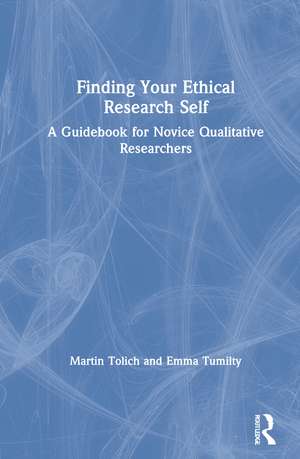Finding Your Ethical Research Self: A Guidebook for Novice Qualitative Researchers
Autor Martin Tolich, Emma Tumiltyen Limba Engleză Hardback – 31 mar 2021
With numerous examples of ethical dilemmas and issues and questions and exercises to encourage self-reflection, this reflexive, learn-by-doing model of research ethics will be highly useful to the novice researcher, undergraduate, and postgraduate research student.
| Toate formatele și edițiile | Preț | Express |
|---|---|---|
| Paperback (1) | 257.05 lei 3-5 săpt. | +16.74 lei 4-10 zile |
| Taylor & Francis – 31 mar 2021 | 257.05 lei 3-5 săpt. | +16.74 lei 4-10 zile |
| Hardback (1) | 765.84 lei 6-8 săpt. | |
| Taylor & Francis – 31 mar 2021 | 765.84 lei 6-8 săpt. |
Preț: 765.84 lei
Preț vechi: 1028.38 lei
-26% Nou
Puncte Express: 1149
Preț estimativ în valută:
146.56€ • 152.45$ • 120.100£
146.56€ • 152.45$ • 120.100£
Carte tipărită la comandă
Livrare economică 15-29 aprilie
Preluare comenzi: 021 569.72.76
Specificații
ISBN-13: 9780367174774
ISBN-10: 0367174774
Pagini: 208
Ilustrații: 4 Line drawings, black and white; 1 Halftones, black and white; 5 Illustrations, black and white
Dimensiuni: 156 x 234 mm
Greutate: 0.54 kg
Ediția:1
Editura: Taylor & Francis
Colecția Routledge
Locul publicării:Oxford, United Kingdom
ISBN-10: 0367174774
Pagini: 208
Ilustrații: 4 Line drawings, black and white; 1 Halftones, black and white; 5 Illustrations, black and white
Dimensiuni: 156 x 234 mm
Greutate: 0.54 kg
Ediția:1
Editura: Taylor & Francis
Colecția Routledge
Locul publicării:Oxford, United Kingdom
Public țintă
Postgraduate and UndergraduateCuprins
1. The One-Minute Ethicist 2. Organising the Reader 3. Is Eve’s Story Venkatesh’s Story? 4. When Consent Is Uninformed, Empower Participants and Activate a Reference Group 5. Do Quantitative and Qualitative Research Have Similar Ethical Considerations? 6. The Limits of Confidentiality in Unstructured Interviews and Focus Groups 7. Irregular Types of Informed Consent in Narrative Research, Autoethnography, Photovoice, and Participant Observation 8. Negotiating Ethics Within a Memorandum of Understanding (MOU) 9. Formal Ethics Review: Research Governance Is Not Research Ethics 10. Don’t Invent the (Ethics) Wheel: Use (TREAD), The Research Ethics Application Database 11. Researching in Harm’s Way 12. Looking Back: The Path was Always There
Notă biografică
Martin Tolich is Associate Professor, Sociology, Gender and Social Work, Otago University, New Zealand. He is a specialist in qualitative research and research ethics, publishing books for Sage, Oxford University Press, Pearson and Routledge, and in 2008 founded the independent New Zealand ethics committee.
Emma Tumilty is a bioethicist at Deakin University, Australia. Her work in research ethics is informed by time on ethics review committees, providing ethics consultation services, and developing her own ethical practice. She is a member of AEREO (https://www.med.upenn.edu/aereo/) and a book review editor for the International Journal of Feminist Approaches to Bioethics.
Emma Tumilty is a bioethicist at Deakin University, Australia. Her work in research ethics is informed by time on ethics review committees, providing ethics consultation services, and developing her own ethical practice. She is a member of AEREO (https://www.med.upenn.edu/aereo/) and a book review editor for the International Journal of Feminist Approaches to Bioethics.
Recenzii
"Finding Your Ethical Research Self is engaging and effective, avoiding a dry conceptual approach to key issues, instead, bringing the topic ‘alive’. Student feedback was very positive, suggesting they found the book’s workshops to be highly effective in addressing key tenets of qualitative research ethics facilitating their learning." -- Dr Mark Falcous, Senior Lecturer, School of Physical Education, Otago University, New Zealand
"The workshop gave students a rich opportunity to discuss real-life dilemmas that qualitative researchers typically experience. It also turned out to be a valuable experience to engage with a set of essential principles for those who do qualitative research, such as belonging to a reference group, within which researchers can reflect on and discuss ethical issues inherent to research." -- Dr. António Pedro Costa, University of Aveiro, Portugal
"The workshop gave students a rich opportunity to discuss real-life dilemmas that qualitative researchers typically experience. It also turned out to be a valuable experience to engage with a set of essential principles for those who do qualitative research, such as belonging to a reference group, within which researchers can reflect on and discuss ethical issues inherent to research." -- Dr. António Pedro Costa, University of Aveiro, Portugal
Descriere
Finding Your Ethical Research Self introduces novice researchers to the need for ethical reflection in practice and gives them the confidence to use their knowledge and skill when, later as researchers they are confronted by big ethical moments in the field.
